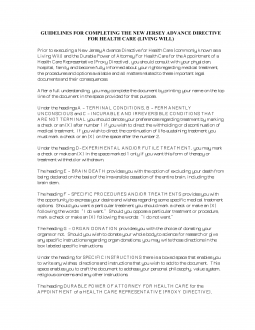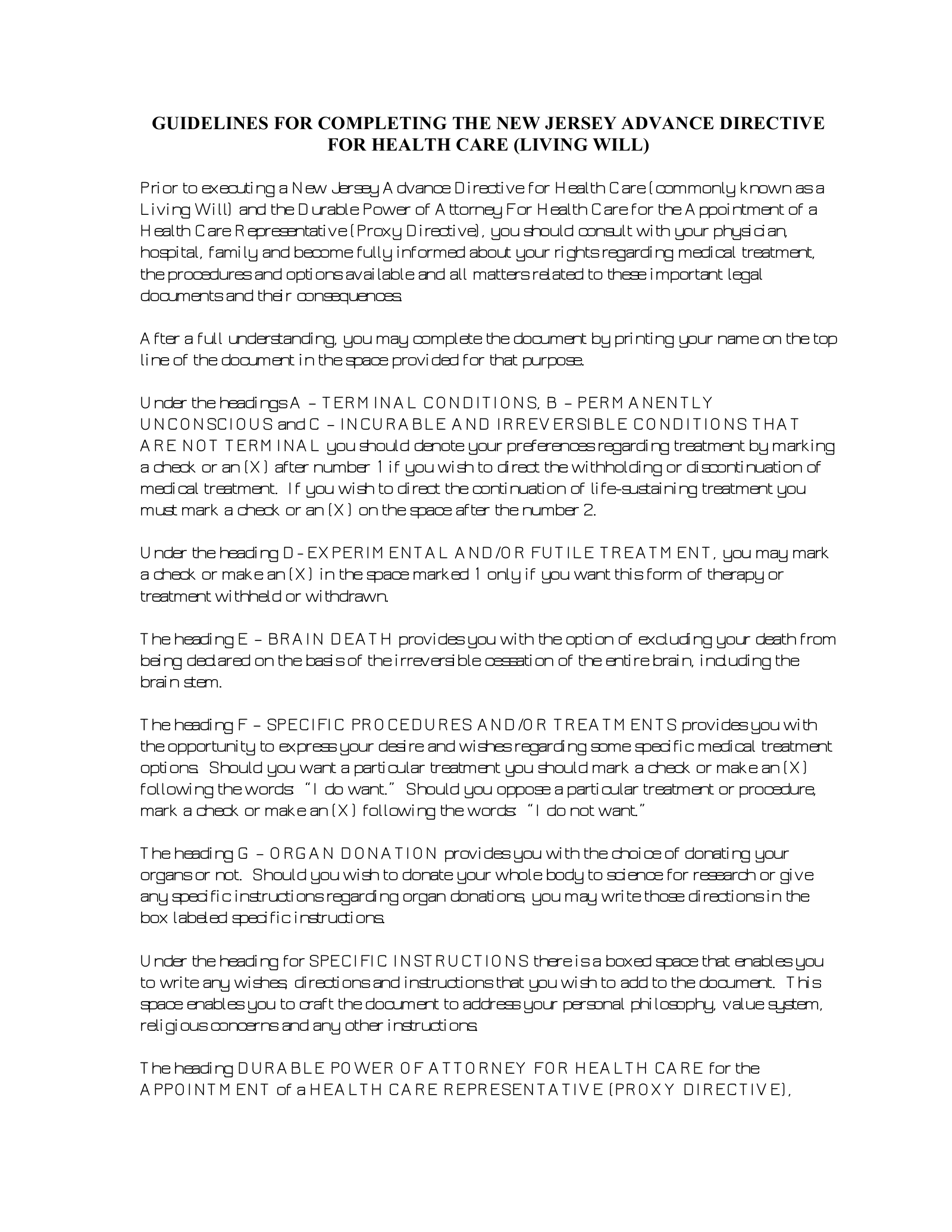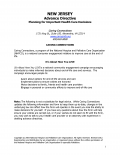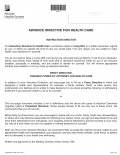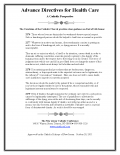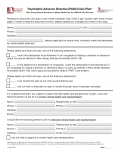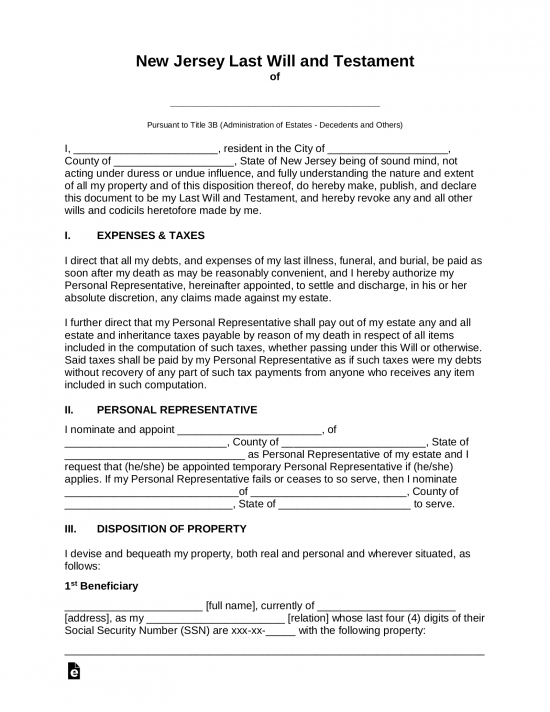Updated July 28, 2023
A New Jersey advance directive is a document that lets a person outline their preferred end-of-life treatment options and select an agent to speak for them if they cannot do so for themselves. A directive is a combination of a power of attorney and a living will that outlines a person’s health care goals in the chance if they become incapacitated. Once the form is completed and signed, it may be used when the patient is no longer capable of making their own decisions.
Advance Directive Includes
Table of Contents |
Laws
Statutes – New Jersey Advance Directives for Health Care Act[1]
Signing Requirements – Two witnesses or notary public.[2]
State Definition – “Advance directive for health care” or “advance directive” means a writing executed in accordance with the requirements of this act. An “advance directive” may include a proxy directive or an instruction directive, or both.[3]
Versions (7)
- AARP
- Atlantic Health System
- Catholic Church
- Hackensack UMC
- Psychiatric Advance Directive
- Spanish (Español) Version
- Virtua Health System
Download: PDF
Download: PDF
Download: PDF
Download: PDF
Download: PDF
Download: PDF
Download: PDF
How to Write
Download: PDF
Introduction
(1) New Jersey Principal Identity. The Patient declaring his or her decisions on treatment and appointing a Health Care Representative in the State of New Jersey will be referred to as the New Jersey Principal. Assuming that you are the New Jersey Principal, record your entire name in the first declaration.

A. Terminal Condition
(2) Refuse Life-Sustaining Treatment. If you have a terminal condition where death is unavoidable, then you may use this discussion to instruct New Jersey Physicians not to prolong your life beyond a natural death. If your medical condition has rendered you unable to maintain vital body functions, then you may initial the first statement choice provided to refuse medical procedures given simply to extend your life.
(3) Accept Life-Sustaining Treatment. If you wish to pre-authorize the administration of life support or life-sustaining treatment when your body cannot maintain itself effectively, then initial the second statement.
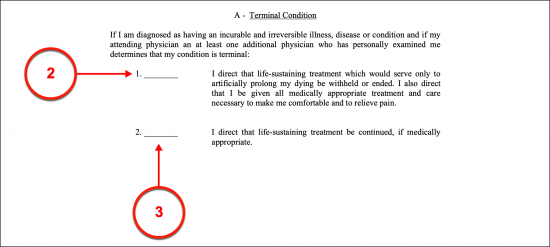
B. Permanently Unconscious
(4) Deny Life-Support. If you are rendered in a permanent vegetative state (commonly referred to as a ‘coma’) then, eventually New Jersey Physicians will need to administer medical treatment aimed at performing functions to prolong your life. You can deny this treatment prematurely by initialing the first statement on this topic.
(5) Authorize Life Support. You can inform New Jersey Medical Personnel that you authorize life support procedures delivered while you are unconscious when such treatment is needed to keep you alive longer or extend your life.
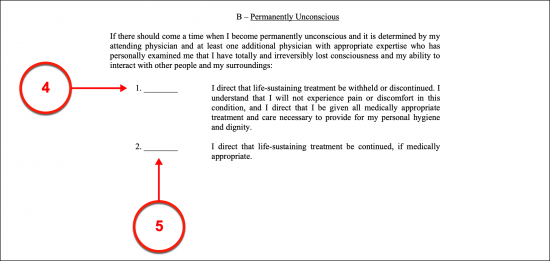
C. Incurable And Irreversible Conditions That Are Not Terminal
(6) Refuse Life-Prolonging Treatment. While some medical conditions that are incurable will result in a permanent vegetative state and others can be considered fatal, still, others may be incurable or irreversible but not a direct cause of death (i.e., some immunocompromised diseases are not fatal but leave the Patient vulnerable to life-threatening medical events). If you do not wish to authorize life-prolonging treatment when diagnosed with such a medical condition, then initial the first directive in Section C.
(7) Approve Of Life-Prolonging Treatment. If you intend to approve of receiving life-sustaining treatment whenever this is needed to extend your life, supply your initials to the second directive.
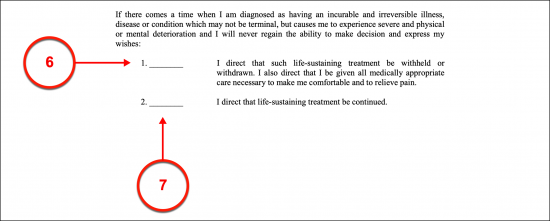
D. Experimental And/or Futile Treatment
(8) Comfort Care Over Longevity Request. If New Jersey Doctors can only present an experimental treatment that does not hold a reasonable promise of success, then you can issue a declaration that you wish to deny treatment focused on longevity (which only tries to extend your life) and that, instead, the goal of treatment should be to keep you comfortable and provide relief from pain by initialing the statement in Section D. To refrain from making this declaration so that all life-sustaining treatment is administered during experimental treatments, do not initial this statement, or cross it out.

E. Brain Death
(9) Declaring Full Death. Generally, in this state, you can be declared dead at the point of brain death. This is when activity in the brain ceases. In a significant number of cases, the body can continue living for quite a while independently then even longer when placed on life-support. To require New Jersey Physicians to declare you dead only when both your brain and body shut down, then you must produce your initials to Section E’s directive (titled “Brain Death”).

F. Specific Procedures And/or Treatments
(10) Requesting And Forbidding Specific Treatments. This document shall provide the New Jersey Principal with an excellent opportunity to easily spell out which treatments and procedures he or she wants and which ones he or she would find unacceptable when they are enduring an end-of-life event, an incurable medical condition, or in a permanent vegetative state and unable to communicate (or comprehend) the treatment options presented by Physicians. This task can be achieved through a list of statements where the New Jersey Principal must supply his or her initials to indicate he or she wants the treatment discussed in that statement or intends to refuse the concerned treatment. By going through this list of statements and either initialing the “I Do Want” or “I Do Not Want” statement, you (as the New Jersey Principal) can inform Reviewers whether or not you want and approve of receiving cardiopulmonary resuscitation, mechanical respiration (i.e. a CPAP mask or intubation tube connecting you to a breathing machine), tube feedings to receive water and food, antibiotics, as much pain relief treatments the State of New Jersey allows, kidney dialysis, surgery (i.e. amputations), and blood transfusions. It should be mentioned that denying many of these treatments when New Jersey Doctors wish to use them could result in death relatively quickly.
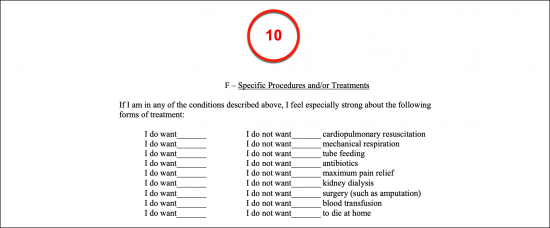
G. Organ Donation
(11) Decision On Anatomical Gifts. You can declare that you wish to approve of organ donations made upon your death in the State of New Jersey by initialing the first blank line of this directive or you may state that you do not wish to make any anatomical gifts by placing your initials to the second blank line
Specific Instructions
(12) Direct New Jersey Principal Declarations. As the New Jersey Principal issuing this document, you can address medical scenarios and issue instructions directly to attending Physicians in this state using the space provided. It should be noted that unless you state as much, the treatment preferences and concerns you address will take precedence over treatment decisions made by your Health Care Representative on your behalf.

HIPAA Provision In Medical Directives
(13) Authorizing Signature. You must sign the approval statement provided if you intend to allow your Health Care Representative to act on your behalf under the Health Insurance Portability And Accountability Act of 1996. Once done, continue to the next area where your Agent should be named.
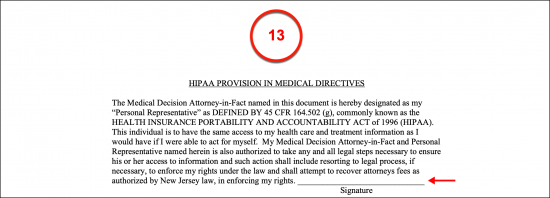
The Proxy Directive
(14) New Jersey Principal. Dispense your name to the appointment statement displayed
(15) New Jersey Health Care Representative. Your New Jersey Health Care Representative must be identified with his or her name. This is the Party that you must always keep well informed regarding your beliefs and preferences for medical treatment and, through this document, will be given the authority to present your treatment directives to attending Medical Professions in this state when you are in need of treatment but do not have the ability to communicate.
(16) Representative Address. The city, state, and zip code where the Health Care Representative resides should be documented.
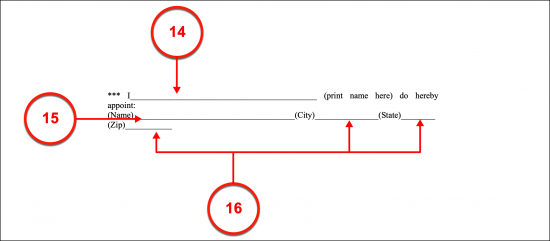
(17) Alternate New Jersey Health Care Representative. It is recommended that you keep at least one other Party abreast of your medical preferences (in addition to the New Jersey Health Care Representative). If your currently named New Jersey Health Care Representative cannot effectively represent you, refuses the responsibility when it is presented, or is entirely unreachable then, an Alternate New Jersey Health Care Representative can be designated with the power to speak to Doctors in this state on your behalf. This Alternate Representative will only be able to step into this appointment if you grant him or her the power to do so by producing the Alternate Agent’s name where requested. This does not give the Alternate Agent the ability to make medical decisions on your behalf while you are able to or while your New Jersey Health Care Representative is fulfilling this role’s requirements.
(18) Alternate New Jersey Health Care Representative Telephone Number.
(19) Alternate Representative Address. The address, city, state, and zip code where the Alternate Representative can be reached should accompany his or her name in this appointment. It is crucial that this information is presented, since this Party may be contacted when New Jersey Physicians require a treatment decision quickly when time has been lost attempting to gain it from the original Health Care Representative named.
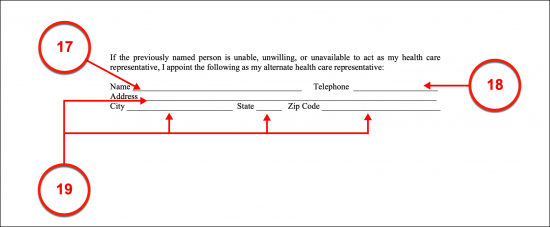
New Jersey Principal Signature
(20) New Jersey Principal Signature Date. This directive will only be effective if it is properly signed by the New Jersey Principal. This means that as the New Jersey Principal, you must give it a final review then gather this document and its attachments before a Notary Public or two adults Witnesses then complete the signature area displayed. Begin by recording the date of your act of signing.

(21) New Jersey Principal Signature. Under the observance of either two adult Witnesses or a licensed Notary Public, sign your name to the signature line then complete the remainder of this area with your residential address.

(22) Witness Verification. If you have signed your name before two adult Witnesses, then each one must sign a unique signature line and print his or her name to the right of the provided signature. The home address of each Witness must also be supplied with this signing. This will enable future inquiries regarding the authenticity of your execution of this document to be directed for further testimony (if needed in the future).
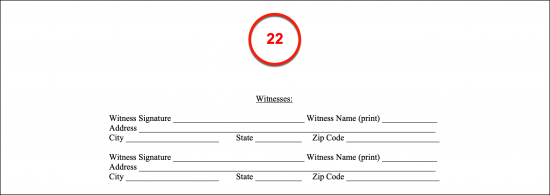
(23) Notary Verification. If you have decided that a Notary Public should be used to verify your signature as one made by you while completely aware of your actions, then follow the Notary Public’s directions. He or she will provide the notarial testimony needed according to the procedures set by the jurisdiction where this signing occurs. This is often recommended since tracking down a Notary Public for additional confirmations can be much easier than two separate Witnesses.

New Jersey Practitioner Orders For Life-Sustaining Treatment (POLST)
(24) Name Of New Jersey Patient. The next form, known as the POLST or Practitioner Orders For Life-Sustaining Treatment, will need to be authorized (by signature) by a Physician, Advanced Registered Nurse Practitioner, or Physician’s Assistant and completed with the New Jersey Patient or the New Jersey Patient’s authorized Surrogate. This document will be kept in the New Jersey Patient’s medical files and must begin with a record of the Patient’s entire name (last name, first name, then middle name).
(25) New Jersey Patient’s Date Of Birth
(26) New Jersey Patient’s Address.
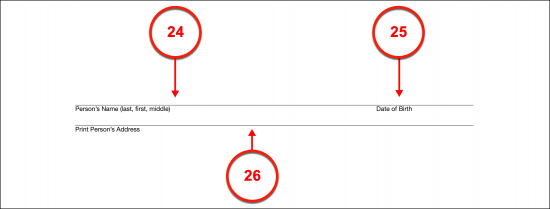
Section A Goals Of Care
(27) Preauthorized Treatment Goals. The Physician and Patient may have decided what treatment goals should be assigned to which pre-existing conditions or future possible medical conditions that may leave the Patient unable to communicate while in need of treatment intervention to live past a medical event. For instance, terminally ill Patients with no hope of recovery may wish their treatment goals to be geared only to comfort rather than extending life through artificial means. Dispense the New Jersey Patient’s treatment goals (as authorized by the consulting Physician) to the space provided.

Section B Medical Interventions
(28) Full Treatment Intervention. The New Jersey Patient can determine and declare the level of medical intervention Physicians in this state may engage in when he or she is suffering a traumatic or life-threatening medical event while unable to communicate using this document. The first optional directive is to request that full medical intervention or treatment is given to the Patient by New Jersey Doctors to ensure survival regardless of comfort or chances of recovery. Mark the first checkbox in the “Medical Interventions” section to solidify this as the Patient’s desire. Be advised, this statement only applies to conditions outside of cardiopulmonary failure.

(29) Limited Treatment Approved. If the New Jersey Patient has indicated that he or she does not wish to receive the full scope of treatment available because of comfort concerns, ethical beliefs, or other reasons, then select the second directive provided. This directive requires some additional definition by indicating if the New Jersey Patient will accept hospitalization for medical intervention or if the New Jersey Patient refuses hospitalization unless it is to ensure his or her comfort. Check the appropriate checkbox to indicate the New Jersey Patient’s level of willingness to be hospitalized once it has been indicated that he or she only approves of limited treatment intervention.

(30) Symptom Treatment Only Directive. If the New Jersey Patient only wishes Medical Professionals in this state to focus on comfort and an aggressive pain management program (if needed) rather than the administration of a treatment that will only extend life without the chance of recovery, then select “Symptom Only Treatment.” This can also be referred to as comfort care (colloquially).
(31) Additional Orders. An area has been provided to document any details needed for a complete record of the Patient’s wishes. This can be especially useful if the New Jersey Patient has indicated he or she would like treatment in a limited capacity (i.e. a trial period).
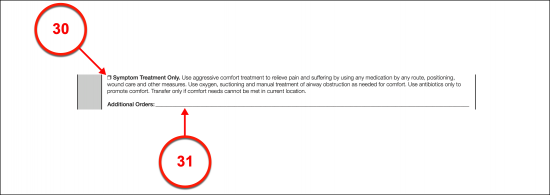
Artificially Administered Fluid And Nutrition
(32) No Artificial Nutrition. When a Patient in New Jersey is unable to eat or drink, even with the assistance of Medical Staff, then Physicians in this state will respond by delivering food/nutrients and water through artificial methods directly to the Patient’s body. For instance, a tube connected to his or her gastrointestinal tract or an I.V. that delivers the needed nourishment and hydration (directly) to his or her bloodstream.
(33) Long-Term Artificial Nutrition. If the New Jersey Patient expects and approves of Medical Professionals in this state using artificial delivery systems of nutrients/food and water when he or she is in danger of malnourishment, starvation, or dehydration and cannot intake nutrients and water independently then select the second directive in this section. This will give New Jersey Doctors the needed Patient-approval to administer nutrients and liquids medically but is unconscious, cannot communicate, and requires significant medical care.
(34) Defined Trial Period Of Artificial Nutrition. If the Patient indicates that he or she can tolerate artificial delivery systems of nutrients and fluids but only for a limited amount of time, then mark the check box for the third directive choice in this section. It is strongly recommended to define this trial period in the space provided near the end of this document.
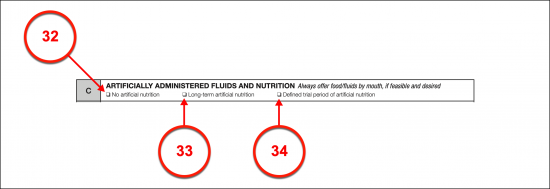
Section D
Cardio Pulmonary Resuscitation (CPR)
(35) Direction To Attempt Resuscitation/CPR. This document must now deal with the possibility of the New Jersey Patient being found with a nonfunctional heart or lungs. When this cardiopulmonary failure occurs, death should be considered minutes (at most) away in most cases. If the New Jersey Patient wishes that CPR or cardiopulmonary resuscitation is employed in an attempt to stave off death, then it is strongly recommended that this desire is indicated by marking the first checkbox in this section. This will allow First Responders and Medical Professionals who are accessing the Patient’s medical file to verify the Patient’s consent quickly.
(36) Instruction To Allow Natural Death. Some medical conditions will warrant the New Jersey Patient’s desire to accept a natural death when a cardiopulmonary failure occurs. If the Patient behind this document wishes to inform First Responders and other Medical Professionals to allow natural death to occur, then select the “Do Not Attempt Resuscitation” directive.
Airway Management
(37) Artificial Ventilation. If a New Jersey Patient is unable to breathe, Physicians will wish to remedy this problem as quickly as possible through a variety of methods including intubation. If the Patient approves of any means needed to ensure that he or she can safely intake and absorb oxygen, then select the “Intubate/Use Artificial Ventilation” directive.
(38) Do Not Intubate. The New Jersey Patient behind this form can prematurely deny the procedure of intubation as a remedy to being unable to intake oxygen by selecting the “Do Not Intubate” directive.
(39) Deliberate Instructions. As mentioned earlier the Patient may opt to receive any number of treatments on a trial basis in the hopes of recovery. Such instructions, as well as any others needed to define the New Jersey Patient’s expectations for medical treatment and interventions, should be provided to the content of this form. This area may be left unattended if no additional instructions are needed to define the New Jersey Patient’s wishes.
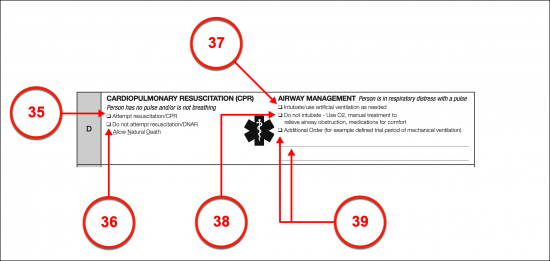
Part E
(40) Loss Of Informed Consent Directive. Unfortunately, the New Jersey Patient may suffer a loss of cognizance, judgment, or consciousness. When this happens, he or she, naturally, becomes incapable of making an informed decision. The Patient can set his or her Surrogate to handle the decision making tasks Doctors require to administer or deny needed life-prolonging treatment by selecting the “Yes” box of Section E. If he or she does not wish a Surrogate to make his or her medical decisions when unable to then select the “No” box in Section E.

SignaturesNew Jersey Patient Or Declarant
(41) Print Name. The Party executing this form to define the New Jersey Patient’s wishes must be identified. This Declarant must print his or her name.
(42) Signature. The New Jersey Declarant is expected to sign this form to put it in effect.
(43) Entity Type. If the Patient is unconscious, unable to communicate, or simply lacks the mobility to effectively issue a signature, then a Proxy will have signed this form on his or her behalf. A list of checkboxes will be able to define this Signature Party as the New Jersey Patient or “Person Named Above,” the New Jersey Patient’s “Health Care Representative/Legal Guardian,” his or her “Spouse/Civil Union Partner, the Patient Parent (if a Minor),” or some “Other Surrogate” with the legal authority to represent the New Jersey Patient to the Medical Professional authorizing this document. Select the category in which the Signature Party or New Jersey Declarant falls into from the provided options.
New Jersey Physician Authorization
(44) Organ Donor Determination. If the Medical Professional completing this form is aware of the New Jersey Patient’s status as an Organ Donor, then he or she should select the “Yes” box to establish the Patient has given consent to anatomical donations or select the “No” box to show otherwise. If this status is “Unknown” then the third definition to this status should be selected.
(45) Medical Professional’s Printed Name. The licensed Professional completing this document may be a Physician, an Advance Practitioner Nurse, or a Physician’s Assistant. This Party must print his or her name then dispense the phone number where he or she can be contacted or reached.
(46) Physician Signature And Date. The Physician, APN, or PA attending this form must sign his or her name and document the date and time he or she performed this action of authorization by signature.
(47) Professional License Number.
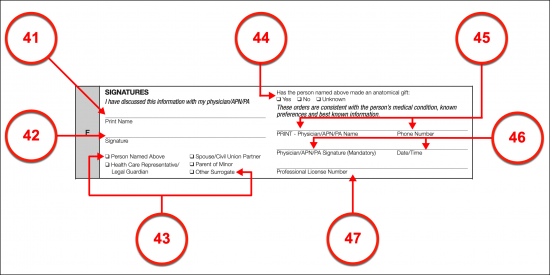
Surrogate Information
(48) Advance Directive Status. If the New Jersey Patient has issued an Advance Directive, then display this fact through the box labeled “Yes.” If not, then use the “No” checkbox. If this is not known at the time, then the “Unknown” checkbox can be used for this section. This section should only be completed if you have selected “Yes” in section E.
(49) Name Of Surrogate. If the New Jersey Patient authorizes a Surrogate to speak for him or her regarding medical intervention or treatment decisions, then produce his or her full name.
(50) Surrogate Contact Information. The telephone number(s) where the New Jersey Patient’s Surrogate can be reached must be documented along with this or her residential address.
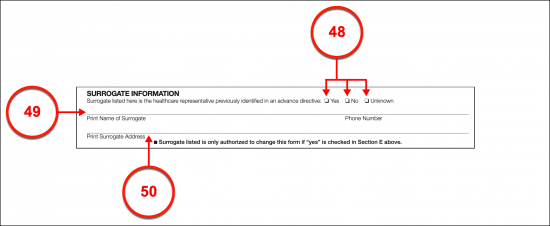
Related Forms
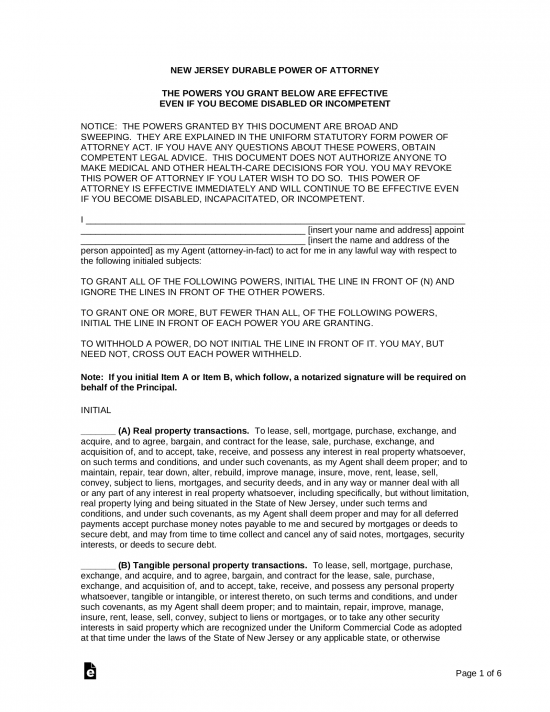 Durable (Financial) Power of Attorney
Durable (Financial) Power of Attorney
Download: PDF, MS Word, OpenDocument
Download: PDF, MS Word, OpenDocument
Sources

